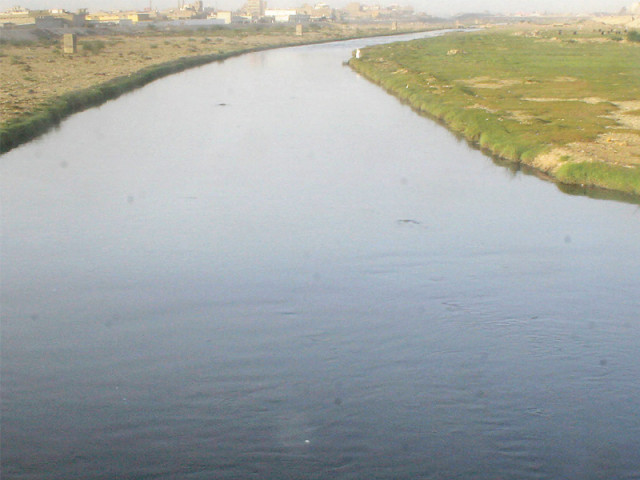Thatta and Badin may cease to exist in 30 years if dams are built, warn speakers
Pakistan Fisher Folk Forum announces a series of protests against construction of Bhasha Dam.

Thatta and Badin may cease to exist in 30 years if dams are built, warn speakers
Hundreds of fishermen and a few representatives of civil society attended the event, arranged at an old tourist attraction on Kotri Barrage, Al-Manzar.
The fishermen fumed and some even burst out in rage, as they referred to the dunes of sand which filled the riverbed, where water had once flowed.
“The fishermen will hold protests, walks, seminars, and other events from March 14 till April 1 against the construction of Bhasha Dam, and to demand the decommissioning of all the dams built on the Indus River,” announced the chairman of the Pakistan Fisher Folk Forum, Muhammad Ali Shah. “The people of Sindh will have to raise their voice if they want to save their civilisation. If there is no river, there will be no civilisation.”
IDAR is observed separately from World Water Day which falls on March 22. “There are two groups of people, one which marks the day to promote their interests by offering solutions for water conservation, through dams or other means,” said Shah. “The other group is made of the communities affected by the construction of dams, water scarcity, river pollution and ecological imbalance.” He held the first group responsible for the adversities faced by the second. “There is a nexus between construction companies, international financial institutions, environmental consultants and the corrupt bureaucrats and politicians,” he alleged.
Shah referred to studies which proved that the emission of methane gas from reservoir surfaces, spillways and turbines of dams also contribute a great deal to global warming. According to him, the dams prevented the rivers from completing their hydrological cycle by flowing towards the sea naturally, consequently damaging the environment. “Over three million acres of land was lost because of sea intrusion in Badin and Thatta,” he said. “The Indus delta has been destroyed and mangroves depleted.”
The activists who have been protesting against the construction of Kalabagh Dam, Greater Thul Canal and other projects on the Indus River, demanded that at least 35 million acre feet of water be discharged downstream from Kotri. They argued, with evidence though, that the decrease in water discharge had taken away livelihoods of thousands of fishermen, agriculturists and other associated professions in Jamshoro, Thatta and Badin districts.
A researcher, Jami Chandio, said that in the next two to three decades, the two tail-ender districts - Thatta and Badin - may not exist if the sea continued to intrude inland at the current rate. He claimed that the sea had already entered the underground water in Tando Muhammad Khan district.
Zulfiqar Halepoto of the Sindh Democratic Forum criticised the ruling Pakistan Peoples Party (PPP) for breaking its promise, made during the Anti-Greater Thul Canal Movement to oppose any new dams built on the Indus River. He said that although the PPP was able to overcome the challenges of passing the watershed constitutional amendments it could not form a water policy acceptable to all the stakeholders.
He highlighted that even the United Nations did not provide any set of regulations for control or use of the rivers and asked the government legislate a National Rivers and Water Act for protecting the water lifeline, establishing local control, opposing commercial trade and among other laws.
Karachi
Two position papers – Water in River Indus Downstream Kotri and Manchar Lake – were launched at the event organised by Karachi by the Friends of Indus Forum (FIF) in collaboration with WWF Pakistan.
A documentary, “We All Live Downstream” was also screened to depict the deplorable picture in different parts of the world. It showed that dams had adversely affected biodiversity and harmed the indigenous communities. “Save a river – save a life, beauty, culture and home” was the message.
While describing the Indus Water Treaty as an ‘irreversible loss,’ the speakers demanded improvements in future policies and strategies on water conservation. “Our focus must be on sustaining the present agriculture,” said the former federal minister and water expert ANG Abbasi. The treaty had granted India the right to irrigate 1.3 million acres of land without any restriction on consumption.
However, Karamat Ali, the executive director of the Pakistan Institute of Labour Education and Research, wished that the treaty be done away with. “We murdered the rivers by agreeing to divide resources granted by nature,” he said.
Abbasi said that the environmental conditions and ecosystems of Indus Delta had deteriorated drastically which was very alarming. The damage was not documented hence the current water conditions could not be estimated. “No further commitment should be made without considering the environmental needs of our ecosystem,” he said.
Sindh Irrigation Minister Jam Saifullah Dharejo said that the last two years were very significant in terms of studying the impacts of climate change. Pakistan had witnessed devastating floods in 2010 and 2011 and rehabilitation of flood-affected people and draining water from the areas were two big challenges.
Published in The Express Tribune, March 16th, 2012.



















COMMENTS
Comments are moderated and generally will be posted if they are on-topic and not abusive.
For more information, please see our Comments FAQ